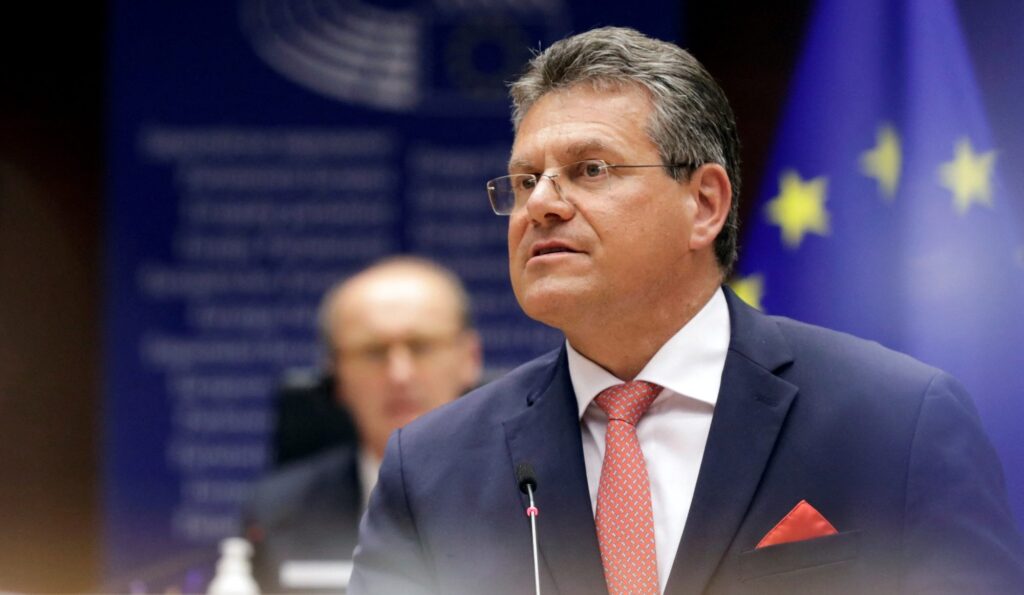EU keeps UAE on watchlist
Designation ‘not linked’ to talks
Deal expected within six months
The European Union has relaunched free trade talks with the UAE, even as it continues to keep the Gulf state on its money laundering watchlist, a designation that can pose risks for investors.
In February last year the UAE was removed from the Financial Action Task Force (FATF)’s grey list after being praised for reforms to curb illicit financial flows.
But the EU has kept the UAE on its own watchlist, with lawmakers in Brussels blocking a proposal to take it off last year, citing continued concerns over money laundering and terrorist financing.
Maros Sefcovic, the EU trade commissioner, said the designation would not affect trade talks.
“We do not see this process as interrelated or linked,” he told AGBI at a press conference in Dubai on Wednesday. “I have to compliment the UAE for achieving huge progress in that regard. We are very optimistic.”
Philippe Richard, executive director of international affairs at Abu Dhabi Global Market, said last year that the EU grey list had not affected the UAE so far.
For the UAE, negotiations with the EU are especially significant since the 27-member bloc is the Gulf state’s second largest trading partner, making up 8 percent of total non-oil trade, worth close to $68 billion last year, according to state news agency Wam.
Thani Al Zeyoudi, the UAE trade minister, said a deal could be finalised within three to six months and would not affect broader EU-GCC relations.
The talks have been stalled since 2008, with differences over oil and public tenders.
“Blocs move slower than bilaterals. That’s why we’re starting here, to move fast,” Al Zeyoudi said. “We’re very keen on concluding this in a very short period.”
The UAE is the second largest economy in the 44-year-old, six-member Gulf Cooperation Council. Saudi Arabia is the largest. Kuwait, Qatar, Oman and Bahrain are the other members of the economic and political bloc and customs union.
Asked whether US President Donald Trump’s visit to the region earlier this month had prompted concern over competition for Gulf capital, Sefcovic said the EU’s engagement long predates it.
“We’ve been in discussions with the UAE well before we knew [about] President Trump’s visit,” he said. “Our interest is clearly long-term.”
Al Zeyoudi pointed to growing Emirati investment across Europe, even in the absence of a formal trade agreement.
The UAE and France plan to invest up to $50 billion in AI data centres, while the French government has signalled openness to Emirati investment in its nuclear power sector. Separately, the UAE has committed $40 billion to Italy’s core industries and the two countries have agreed to establish an artificial intelligence centre in Italy.
“The momentum is real,” the minister said. “The upside is still huge.”
EU-UAE trade
The EU is the UAE’s top export destination and largest investment partner in the region. Bilateral trade in goods is worth nearly €56 billion annually, with services exceeding €39 billion.
Combined investment stock stands at about €328 billion, according to EU figures.
UAE exports to the bloc include oil, gas and base metals. The EU’s exports comprise motor vehicles, machinery, chemicals, foodstuffs and, increasingly, green technologies. The UAE’s highest tariffs are on tobacco, alcohol and confectionery.
Negotiations will focus on reducing tariffs, boosting digital trade and investment and strengthening cooperation in areas such as green hydrogen, critical raw materials and renewable energy.
The UAE has signed 26 Comprehensive Economic Partnership Agreements (Cepas) since 2021 with countries including India, Indonesia and Australia, as part of its drive to diversify from oil.



